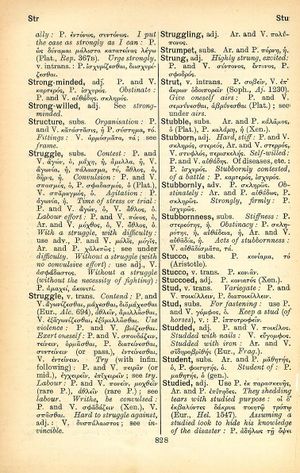stud: Difference between revisions
From LSJ
(3_12) |
m (Woodhouse1 replacement) |
||
| Line 1: | Line 1: | ||
{{Woodhouse1 | {{Woodhouse1 | ||
|Text=[[File:woodhouse_828.jpg|thumb|link={{filepath:woodhouse_828.jpg}}]] | |Text=[[File:woodhouse_828.jpg|thumb|link={{filepath:woodhouse_828.jpg}}]] | ||
===verb transitive=== | |||
[[variegate]]: [[prose|P.]] and [[verse|V.]] [[ποικίλλειν]], [[prose|P.]] [[διαποικίλλειν]]. | |||
===substantive=== | |||
[[for fastening]]: use [[prose|P.]] and [[verse|V.]] [[γόμφος]], ὁ. | |||
[[keep a stud]] (of [[horse]]s), v.: [[prose|P.]] [[ἱπποτροφεῖν]]. | |||
}} | }} | ||
{{Georges | {{Georges | ||
|georg=stud, s. [[iste]]. | |georg=stud, s. [[iste]]. | ||
}} | }} | ||
Revision as of 08:57, 20 May 2020
English > Greek (Woodhouse)
verb transitive
variegate: P. and V. ποικίλλειν, P. διαποικίλλειν.
substantive
for fastening: use P. and V. γόμφος, ὁ.
keep a stud (of horses), v.: P. ἱπποτροφεῖν.
Latin > German (Georges)
stud, s. iste.

